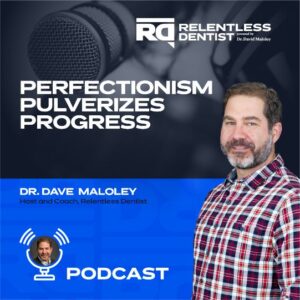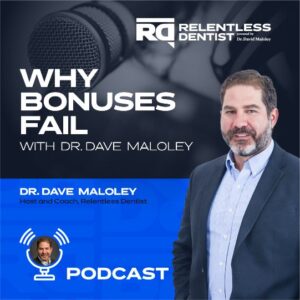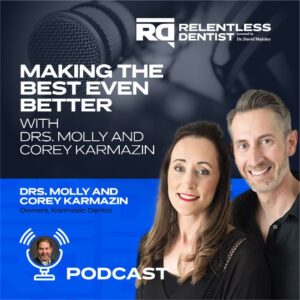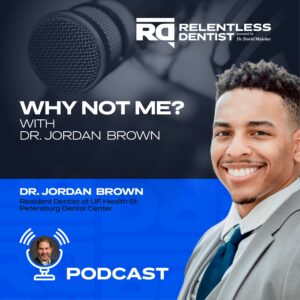by [email protected] | May 26, 2021 | Prescriptions for your Practice
Podcast: Play in new window | Download

Where in your relationships, your health, your financial situation, your clinical dentistry, can the realism of progress take precedence over the fantasy of perfection?
At one point in our life, we have been in a situation wherein we strive to be perfect, only to realize that it is only an illusion that we put upon ourselves out of fear of criticism and rejection.
The key to perfection is acknowledging that it doesn’t exist.
Perfection is fiction, and it can be destructive. I’m not saying that you should lower your standards. Set high standards and strive for excellence, not perfection. You can only achieve success through progressive action.
Listen in as I discuss pointers on how you can identify areas of your life or business where the standard of “perfection” should be replaced with progress.
Tune in and find solutions to common practice issues at Prescriptions for Your Practice
Key Quotes:
- “When it came time for me to cross the finish line, I looked up at my time and the critic turned on, and I was starting to think of ways that should have improved my time and why the time wasn’t good enough. The standard of finishing immediately changed, and I was looking for opportunities where I could have perfected that run.”
- “That is a metaphor for a lot of or our lives. Where is that perfectionism that we’re trained to notice these meticulous details in the mouth, the dentistry that we’re doing, the margins, the bone levels? We’re down to millimeters and microns and that works really well in dentistry, but it can create all sorts of problems with their teams, with their families, in our life.”
- “We create these environments where there’s learned helplessness because our team thinks ‘Well, I can never live up to the doctor’s standards so why even try? I’m not even gonna put up the effort because I’m getting criticized.’ So, it starts to hamper our relationships.”
- “What is perfect? The reality is it doesn’t exist.”
- “The solution isn’t to really lower your standards. But we have to appreciate that the path to mastery is messy. Whenever you start on anything, you suck at it. So you have to give yourself permission to suck and get better, and better, and better.”
- “The solution is making peace with imperfection and falling in love with process and progress.”
- “Human desire isn’t perfection, it is connection.”
- “Understand that we have to change habits to change identity. Once we start to build that confidence, then the success and the progress are inevitable.”
- “Perfection leads to procrastination.”
Featured on the Show:


by [email protected] | May 19, 2021 | Prescriptions for your Practice
Podcast: Play in new window | Download
 Have you been scouring the internet trying to look for the best reward system for your employees? Let me tell you a secret; there’s none! I’ve tried different approaches, many times myself, and they didn’t work.
Have you been scouring the internet trying to look for the best reward system for your employees? Let me tell you a secret; there’s none! I’ve tried different approaches, many times myself, and they didn’t work.
The bonus system aims to give out incentives (monetary or otherwise) to motivate employees to bring out their best and be productive. However, this kind of approach is counterproductive and not to mention expensive.
If you’re looking for a perfect incentive system for your employees, you should not miss out on these three elements: alignment, belonging, and healthy conflict. A reward system should not curb creativity and risk-taking. Once it’s manipulative and punitive, it will predictively fail 100%.
Tune in and find solutions to common practice issues at Prescriptions for Your Practice
Key Quotes:
- “What’s the best bonus system out there? And the short answer, the bottom line up front, is that there is no such thing.”
- “If you work from that mental frame, work for wages, then you immediately assume that if I give more wages, if I give an incentive or bonus program, then I have a better team and I’ll get more and better work… it just doesn’t work.”
- “Modern research says that bonus systems suck, and it can actually demotivate employees, or worse, motivate them to be egocentric, to work on their own self-interests.”
- “Most people are looking for alignment, belonging, and healthy conflict.”
- “You, as the practice owner, are completely limiting the effectiveness of your team if it’s a top-down approach.”
- “If we don’t first fulfill those common human needs, a bonus system will likely be expensive at best, counterproductive at worst.”
- “I really didn’t have the practice or team that I dreamed of until I really dug into the science of human potential, the science of organizational behavior.”
- “No bonus system can match the internal motivations of your team.”
Featured on the Show:


by [email protected] | Apr 14, 2021 | Legendary Leadership
Podcast: Play in new window | Download

Two of my favorite people in this profession, Dr. Molly Karmazin and Dr. Corey Karmazin, join me on this week’s podcast to unpack their secrets to success. Drs. Corey and Molly are among those featured in my “Dentist On A Mission” book. They practice in a gorgeous, state-of-the-art facility in Sioux Falls, SD alongside a very enthusiastic high-performance team.
Listen in as Drs. Molly and Corey talk about how they made their scratch-start dream a reality, how they continue to reinvest in their practice and refine their leadership style to make the best better. They will also share their insights on culture, systems, and lifelong learning.
Tune in and find more Legendary Leadership
Key Quotes:
- “They said in school, one of the hardest things you can do is probably start your own from scratch. And we were like, let’s do it.”
- “I think with the information overload that we get now, I think it would feel daunting. I’d probably still do it [a startup practice].”
- “We’re always big in putting time and effort back into the team because I think it always pays off in spades.”
- “Sometimes you take it personally when people make a decision to make a change. And I feel like there’s no real substitute for just experiencing that. And I won’t say that it makes you kind of cold, but it makes you realize to really appreciate what you have at any given time and just know like there’s going to be things that are switched out.”
- “Anytime someone leaves, this is always for the better. And then it makes our expectations and levels even higher for the next one and we’re quicker to make decisions whether things are working or not.”
- “The thing that I’ve learned, probably the most in the last couple of years, is we’ve found our voice and it doesn’t have to come off as bossy. And being a leader is telling people what you want and giving them the tools to be able to do that.”
- “We had to invest in technology. We had to computerize the office because I wanted to have a seamless flow from our Sioux Falls office to this office. So it was kind of fun.”
- “I still can’t believe we still have patients that we saw like day one. I felt like I knew nothing. I felt like my skills were there, but they weren’t there where they are now. And you’re just like, Oh, these people saw it in you. And they were like, you can do it.”
- “I think doing it on your own, from the get go, you invest so much more in yourself and the business. Whether it’s with technology or remodel, whether it’s just trying to be on top and up, we just constantly re-investing.”
- Every single patient through the door has either come because they’ve picked up the phone and took a chance on us or they have now told other people. And so, we really do very little advertising. A lot of our patients come from, Hey, so-and-so told me to come see you.”
- “Our confidence in ourselves that we can deliver has made a huge difference.”
- “You don’t know what you don’t know and you think you’re doing a good job and you can do great dentistry forever in that little bubble. It’s just been such a pleasure to burst outside of it and to be able to start different things.”
- “Make connections with dentists all across the country and even the world.”
- “You can’t complain and get angry and bitter when you come from a place of gratitude.”
- “Starting each day with a thing of gratitude, I think, has changed everybody.”
Corey and Molly Karmazin started their dental practice 18 years ago in Sioux Falls, SD. They have embraced continuing education and technology and A-Team atmosphere at their office. Grace, Gratitude and Attitude help make each day at Karmazin Dental a GREAT DAY!
Featured on the Show:


by [email protected] | Mar 31, 2021 | Bold Biographies
Podcast: Play in new window | Download

Dr. Jordan Brown reminds me of what’s good about the profession of dentistry. His “Why not me?” attitude is truly admirable. He may be a resident, but don’t let his youth fool you — he is wise beyond his years. His robust story, compelling bio, and positive disposition will surely inspire many in our profession.
Listen in as Dr. Jordan talks about skyrocketing dental tuition, becoming a lifelong student of clinical and communication skills, the importance of access to care of the underserved, and leveraging Instagram as a force for good.
Tune in and find more Bold Biographies
Key Quotes:
- “From seeing that transformative experience from a close family member of mine, that kind of led me to want to not only be a dentist, but be a dentist that’s practicing in underserved areas where I know my work will have the biggest impact on those patients.”
- “I knew I wanted to work in these [underserved] communities and I knew I wanted to have advanced training. So that way, when I did go out and venture on my own, I would know how to handle these cases in a methodical way. Not only just to get the job done, but to get the job done well.“
- “Information should be shared. Knowledge is power.”
- “There are a few different ways that dental students can pay for tuition. One is loans. Most people do that. Second, military. Military is a fantastic option for paying for dental school. But there’s a third lesser-known option that a lot of people don’t know about. And that’s what I did. So I did the National Health Service Corps scholarship program.”
- “You can either work in a fairly qualified health center, you can work in private practices, you can start your own practice. From a private practice standpoint, you can start a practice, but it has to satisfy the criteria that the program sets forth.”
- “In my life I always follow the model of ‘Why not? Why not me?’”
- “I never let difficulty deter me from reaching my goals. And I highly encourage all your listeners, students, dentists, just to think about why can’t you be that person that great things happen to.”
- “You have to make your patients like you because people buy things from people they trust. Patients will not accept your dental treatment recommendations if they don’t like you.”
- “The last thing that I think is really important is that, when you’re checking out your patients at your desk, give them your personal cell phone number.”
- “You have to go above and beyond for your patients because they can go anywhere else to get that treatment.”
- “You can always improve upon yourself and always have a growth mindset. That when you have any setback, any failure in your career, just use that as an opportunity to learn, grow, and improve and just to do better.”
Featured on the Show:


by [email protected] | Mar 17, 2021 | Magnificent Marketing
Podcast: Play in new window | Download
 I have a confession to make. My journey to business was not a piece of cake. You see, I’m an introvert posing to be an extroverted guy trying to connect with the community where I was building my practice. Then came Matthew Pollard, the person that I can relate to. He is the author of the well-received books “The Introvert’s Edge. How the Quiet and Shy Can Outsell Anyone” and “The Introvert’s Edge To Networking”. He’s also a confessed introvert. Yet, instead of making his introversion a handicap, he successfully transformed it into an asset and made it work to his advantage.
I have a confession to make. My journey to business was not a piece of cake. You see, I’m an introvert posing to be an extroverted guy trying to connect with the community where I was building my practice. Then came Matthew Pollard, the person that I can relate to. He is the author of the well-received books “The Introvert’s Edge. How the Quiet and Shy Can Outsell Anyone” and “The Introvert’s Edge To Networking”. He’s also a confessed introvert. Yet, instead of making his introversion a handicap, he successfully transformed it into an asset and made it work to his advantage.
Listen in as Matthew talks about how to find systems that will allow you to fill those skills gaps and leverage on your natural introverted strengths. Find a strategy as an introvert that will work for you.
Be inspired and tune in to more Magnificent Marketing Episode Podcast
Key Quotes:
- “I think the important thing people will realize is, being an introvert doesn’t mean you’re a second-class citizen. It also doesn’t mean you should behave more extroverted and that’s the key to success.”
- “The important thing for introverts to know is that your job is not to educate the client with your years of experience. It’s to motivate and inspire action while embedding you as the only logical choice of which to do that action with.”
- “So the biggest thing that I want everyone to know is first, you don’t need to be extroverted. But as an introvert, it’s not over. Educate and inform to get them to make a decision. It’s to tell them what they need to know to help them make an easy decision.”
- “Let’s frame this in a way that everyone will understand. Real costs — Okay, I’m going to need concentrating because I haven’t done this expensive thing. Second, opportunity costs. Here’s what it’s going to look like if I grind my teeth for the next 20 years and the expensive treatments that I’m going to potentially have because of that. And the emotional cost is, I’m stressed.”
- “You said, we know this, we know this, we know this, we know this. Yes you do. But by saying all of these things, here’s what I hear as a customer. Okay. Fear, fear, jargon, issues, risk, fear, and money. That is all I hear in my head. It sounds like you’re trying to scare me into spending money. It does not sound like you care.”
- “People always have the money. They just act to you that they don’t because all they’re hearing is jargon. Now your teams are just as bad at this. As a matter of fact, they are less experienced than you.”
- “Don’t sell stuff to people that they don’t need. Which story I’d prefer you to is just use logical detail because then, you won’t get the sale. But if you go in to tell a story, make sure that the person will truly benefit.”
- “If you choose a clientele that you really serve, well, then look at the three major outcomes, or the three major problems that they had and create one story for each one of those. Then learn those stories and practice those stories yourself, and like, just roll off the tongue.”
- “Congruence and comfortability and repetition of people hearing the same story over and over will motivate them to take action.”
- “Things have changed. We don’t like getting scared into decisions anymore, right? We love to believe that the person if we believe that you care, we’ll buy anything you put in front of us. If we believe that you’re trying to monetize, we’ll buy nothing. And then we’ll start looking around.”
- “In truth, the reason why a lot of your customers don’t respect you like they used to, the reason why a lot of your customers aren’t open to you suggesting what to buy is mainly because it’s a marketing issue. You don’t know how to articulate your value.”
- “We have to confront that stigma because it doesn’t mean being introverted, doesn’t mean we’re second class citizens. It means our path to success is just different to that of an extrovert. The other thing is we have to stop using it as a crutch.”
- “Empathy is hugely leadership. Empathy is massive in sales listening. It’s something that extroverts perhaps don’t do so well. And because of that, again, we have a massive advantage.”
- “I’ve been responsible for five multimillion-dollar success stories. So for me, one of the things that I always try to get people to understand about my story is that being an introvert doesn’t mean you can’t succeed unless you decide.”
- “Find a strategy as an introvert that will work for you. And you’ll realize that when you find that strategy, you’ll actually run circles around those people that seem to be natural because a system will always outperform one that doesn’t have one.”
Featured on the Show:






 Have you been scouring the internet trying to look for the best reward system for your employees? Let me tell you a secret; there’s none! I’ve tried different approaches, many times myself, and they didn’t work.
Have you been scouring the internet trying to look for the best reward system for your employees? Let me tell you a secret; there’s none! I’ve tried different approaches, many times myself, and they didn’t work.

